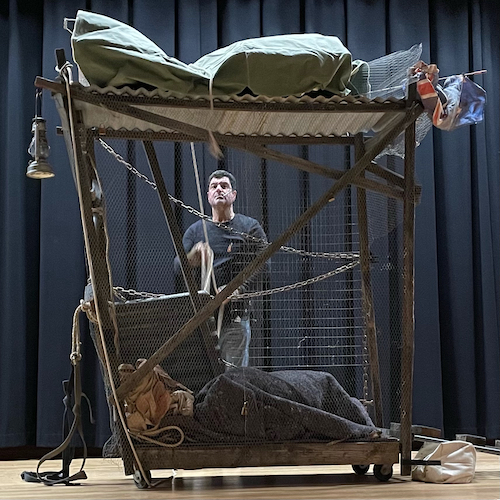30 August 2021

Creative industry researchers at the University of South Australia are integrating live theatre, multimedia, and gaming to deliver a new production that confronts the complex challenges and choices faced by people experiencing domestic violence.
While lockdowns have saved many lives during the COVID-19 pandemic, they have had other consequences, including, tragically, a surge in the incidence of domestic and family violence (DFV).
The restrictions put in place around COVID have exacerbated key challenges faced by people experiencing domestic violence, including an increased sense of oppressive isolation, an inability to safely seek outside help, and lack of access to alternative living arrangements.
These factors can combine to make it extremely difficult for many DFV survivors to change their circumstances, and that situation is often misconceived by well-intentioned onlookers who ask, ‘Why don’t they just leave?’
A new project by UniSA researchers aims to confront and break down that misconception, using live theatre and immersive creative techniques to help people understand the complex, often contradictory choices and challenges faced by DFV survivors.
Led by UniSA theatre academic and director, Dr Corinna Di Niro, a multidisciplinary team spanning gaming, digital media, sound design, and film, is developing a new adaptation of Geoff Gilham’s play Bone Cage, which delivers a stark, surreal depiction of the challenges facing a woman trapped in an abusive relationship.
“There are usually no simple answers for someone experiencing domestic violence, no safe alternative or ‘way out’, but this can be very difficult for outside observers to understand,” Dr Di Niro says.
“This production is a way to help audiences experience that complexity, to see the situation from the inside, and in doing so, hopefully develop a more supportive perspective on the situation.”
To maximise the production’s connection with audiences, Dr Di Niro’s team is embracing a range of creative techniques to deliver the most immersive, engaging experience possible, integrating live performance, extensive video, soundscapes, and interactive, game-like dimensions.
The immersive technology dimensions of the production have initially been designed to suit the specifications of innovative Adelaide venue, The Lab, and the first full multimedia performance of Bone Cage will take place at the venue on Friday 17 September.
“We want this to go way beyond conventional theatre and we’re really pushing the boundaries of creative performance to achieve that. The digital performance platform of The Lab provides the perfect canvas for that,” Dr Di Niro says.
“We want to bring the audience into the story, immerse them in the experience, so they can see the situation from the point of view of the characters involved, and really live through the difficult emotions and choices involved.”
As well as delivering an immersive experience during the show, the research team plans for performances to incorporate workshops, allowing audience members to explore the issues raised and discuss their responses to the situation depicted.
“These are challenging issues, and we don’t only want to raise questions for people, we also want to start the discussion about how to develop answers, and we want the audience to be directly involved in that discussion,” Dr Di Niro says.
Commencing that process, Dr Di Niro and her team will host a research seminar on Friday 3 September, during which they will explore the research and creative process behind their adaptation of Bone Cage.
The event will include a performance of the play along with a Q&A and presentation, engaging both creative researchers and DFV researchers, and Dr Di Niro says this collaborative approach is crucial to the project’s success.
“We are really interested in engaging the community with this project and capturing the lived experiences of those who have experienced DFV first-hand, as ultimately, that’s where the resources to end domestic violence are.
“There is lots of evidence demonstrating the arts as a powerful medium to activate social change and raise awareness on social issues, and now that we’re taking this to the next level by integrating immersive tech, we’re keen to work with other innovative researchers and institutions to see how far we can push this concept.”
Notes to editors:
- The full creative team for Bone Cage is Dr Corinna Di Niro (theatre, UniSA), Susannah Emery (gaming, UniSA), Andrei Gostin (film, UniSA), Dr Phil van Hout (sound, UniSA), industry partner Jonathan Kovarch (digital media/photography) and actors Robert Donnarumma, Suzanne Bleeze, and Georgia Laity.
Media: Dan Lander | mobile: 0408 882 809 | email: dan.lander@unisa.edu.au



